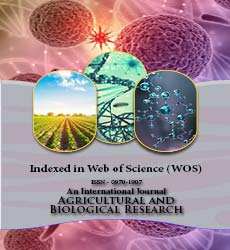Agricultural and Biological Research
RNI # 24/103/2012-R1
Daba Bogale Sima*, Solomon Estifanos and Zebene Asfaw
The article investigates the impact of climate change on agricultural productivity in the Sofi district of Harari regional state, Ethiopia, with a focus on smallholder farmers practicing agroforestry and monoculture. The study aims to understand smallholders' perceptions of climate change, identify climate change indicators, analyze observed climate trends, and explore adaptation strategies. The research employed a mixed-methods approach, combining focus group discussions, semi-structured surveys, key informant interviews, and meteorological data analysis. The study area, Sofi district, was described in terms of geography, climate, geology, soil, and land use. Results indicate that smallholders in Sofi district have observed rising temperatures, decreased rainfall, and increased drought frequency over the last three decades. Smallholder farmers practicing agroforestry are found to be more resilient to climate change impacts compared to monoculture practitioners. The study reveals that farmers perceive frequent droughts, erratic rainfall, shortness of rainy seasons, and temperature increases as significant indicators of climate change. Furthermore, respondents attribute climate change to anthropogenic factors such as deforestation, rapid population growth, and lack of soil and water conservation. Adaptation strategies employed by smallholders include crop diversification, adjusting planting dates, fruit tree-based agroforestry practices, reducing the number of animals kept, compost preparation, and improved animal feed production. Agroforestry practitioners exhibit significant differences in adaptation strategies compared to monoculture practitioners, emphasizing the importance of diverse coping mechanisms. Major constraints faced by farmers include pests and diseases, soil erosion, livestock deaths, crop loss, decreased farm income, and poor soil fertility. The study underscores the role of agroforestry in mitigating these challenges and enhancing smallholders' adaptive capacity. The findings suggest that agroforestry provides shade, fruit for income and consumption, reduces evapotranspiration, and minimizes soil erosion, making it a valuable approach for climate change adaptation. The research implies that promoting agroforestry practices can contribute to sustainable agricultural development and resilience in the face of climate change. Policymakers and agricultural stakeholders should consider supporting and implementing agroforestry initiatives to enhance the adaptive capacity of smallholder farmers in similar contexts.
